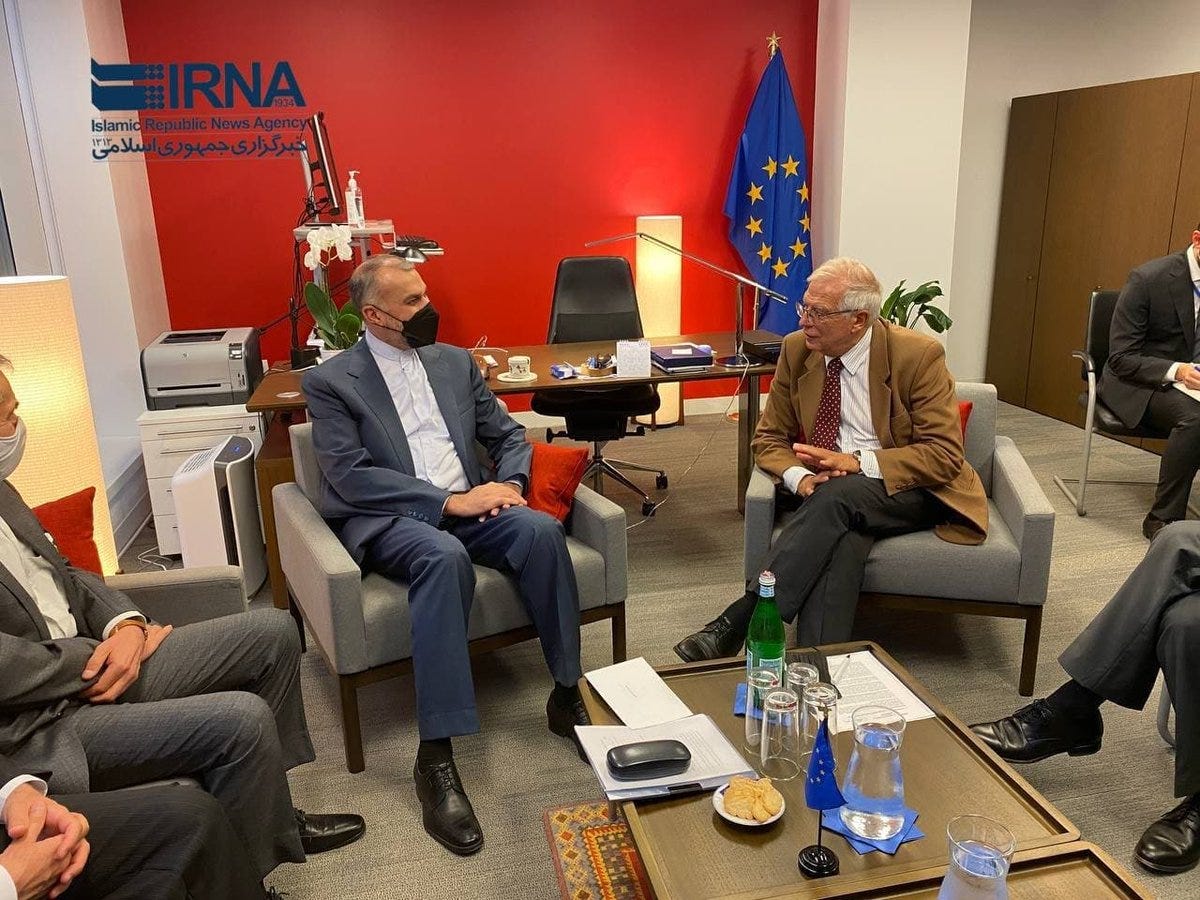Growing gloom on Iran after NY
Diplomats express rising pessimism on prospects for reviving nuclear pact as Iran remains coy on when it might return to talks and is non-committal on P5+1 position it pick up where talks left off

Though new Iranian Foreign Minister Hossein Amir-Abdollahian held dozens of bilateral meetings with his diplomatic counterparts on the sidelines of the UN General Assembly opening session in New York last week and met with the press and experts, diplomats express a growing sense of pessimism, if not total gloom, about the prospects for reviving the 2015 Iran nuclear deal.
“I believe that increasing pessimism is justified,” a European official involved in the talks told me after a week of meetings in New York. “As sad as it may sound.”
The new Iranian government’s coyness about when it might return to indirect talks on the U.S. and Iran returning to full implementation of the nuclear deal has gone from tiresome to concerning, diplomats say. And Iran has apparently given no indication to interlocutors that it respects a united position of the P5+1 (the five permanent members of the UN Security Council plus Germany) that the talks should pick up where they left off in June after six rounds of negotiations in Vienna.
“The Iranians did not give any indication of when they’d come back,” a senior American diplomat, speaking not for attribution, told journalists on a call Sept. 23. “I think they’ve used several words like ‘a few weeks,’ ‘swiftly,’ ‘soon.’ We have heard that for some time. And again, we know they’re going through a transition, but it’s been three months and it’s not clear to us what more they need to review, since the results of Vienna are there for them to see. And then they need to decide are they prepared to come back on that basis or not.”
Iran’s top diplomat Amir-Abdollahian, speaking to journalists in New York on Sept. 24, reiterated Iran’s openness to return to negotiations on reviving the deal, though he did not provide any date. And he stressed, as he has before, that the new government of Iranian President Ebrahim Raisi will be focused on tangible results and actions, not words.
“As far as the government of the U.S. is concerned, the standard for us will be to watch the actions of U.S. officials, and judge based on the actions taken by Pres. Biden, based on which we will form our decisions,” Amir-Abdollahian, speaking through a translator, said in on-record opening remarks at the press event I attended. “Not only based on paradoxical statements and words we keep receiving.”
Regarding the Joint Comprehensive Plan of Action (JCPOA), “the Americans on the one hand keep insisting on a return to the JCPOA, and ask Iran to return to the table in Vienna,” Amir-Abdollahian continued. “However, at the same time, the Biden administration simultaneously is standing up new sanctions on Iran.”
“This paradoxical behavior is not a constructive message to Iran,” the Iranian envoy said. “All while we have stated our clear and unambiguous policies since the inception of the new administration…that Iran will not distance itself from the table of negotiations. We see negotiations as an essential tool of diplomacy.”
Iran earlier had declined a proposal by the European Union coordinator Enrique Mora to hold a meeting of the Joint Commission—which oversees implementation of the nuclear deal--on the sidelines of UNGA events in New York, the US diplomat said.
“Nothing that’s happened…has made us more optimistic, because we’ve not heard anything…about a date, or about Iran’s intentions to continue the work that was begun in Vienna and try to close those gaps,” the senior American diplomat said in the Sept. 23 call. “For now, certainly there’s no…positive indication that Iran is prepared to come back…and to try to close down the remaining issues.”
“The absence of a positive answer leads us to be concerned that they intend to come up with a new framework, or new concerns or new demands,” the American diplomat added.
The Iranians will likely return to the Vienna talks, but with insufficient negotiating flexibility, suggested Ali Vaez, director of the Iran program at the International Crisis Group.
“They will come back to Vienna, but the problem is that, from what Amir-Abdollahian indicated to interlocutors, with significantly less flexibility and basically more intransigence on some of the demands that they have,” Vaez told me. “Which is not good news.”
In the Iranian foreign minister’s bilateral meetings in New York with his E3 and EU counterparts, it was indicated that Iran is likely to drive a much harder bargain, Vaez continued.
In some of the meetings, Vaez heard that Iranian interlocutors used the language of planning to take a “rights-based approach,” which evoked the language of former Ahmadinejad-era Iran nuclear negotiator Saeed Jalili, in which little progress towards a diplomatic resolution on Iran’s nuclear program was made, and the international community passed progressively harsher rounds of sanctions on Iran.
“That is one reason people are more cynical after UNGA,” Vaez said.
“It is possible that the Iranians drag the negotiations well into 2022,” Vaez said. “But it is hard to imagine that the process is sustainable until then, given Iran’s exponential nuclear escalation and lack of cooperation with the IAEA.”
Another expert, asked how a meeting of think tank and arms control experts with the Iranian delegation in New York went, summarized the general mood on prospects for reviving the deal anytime soon.
“Mildly depressing,” he said.
“The minister’s assertion that Iran’s increase in nuclear capacity has been carried out in keeping with the IAEA safeguards requirements suggests he is not familiar with the IAEA’s ongoing and immediate concerns about access and monitoring,” the expert added.
**


